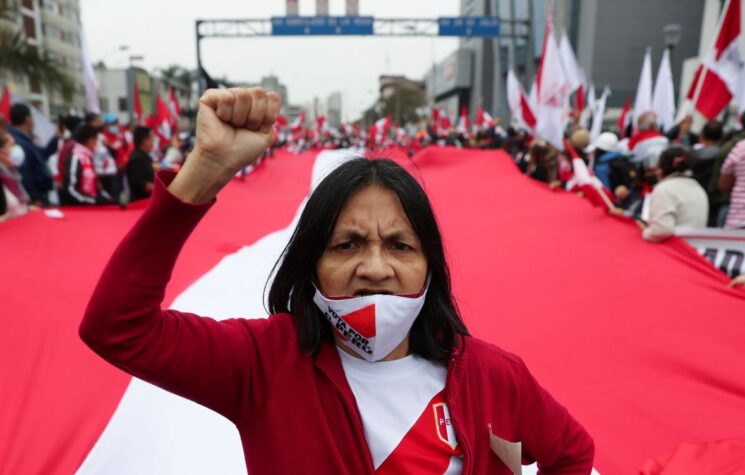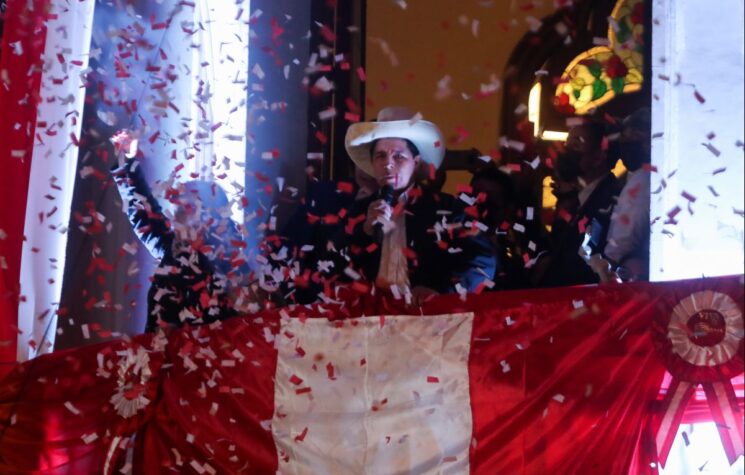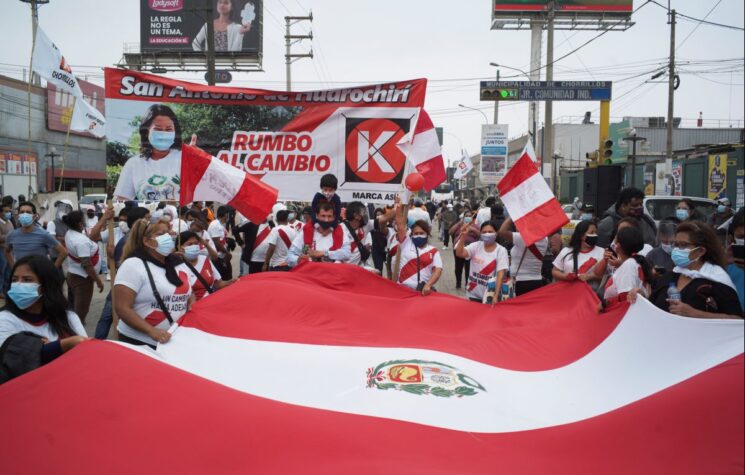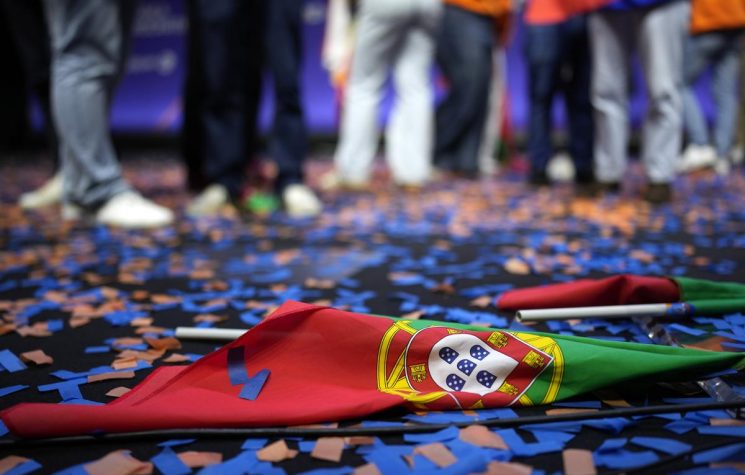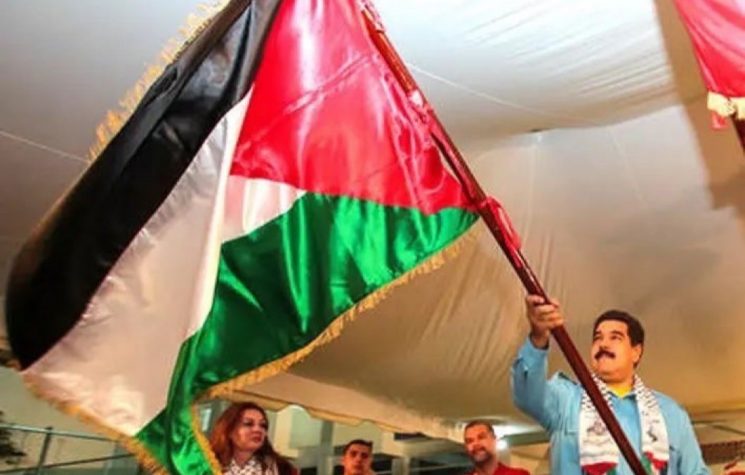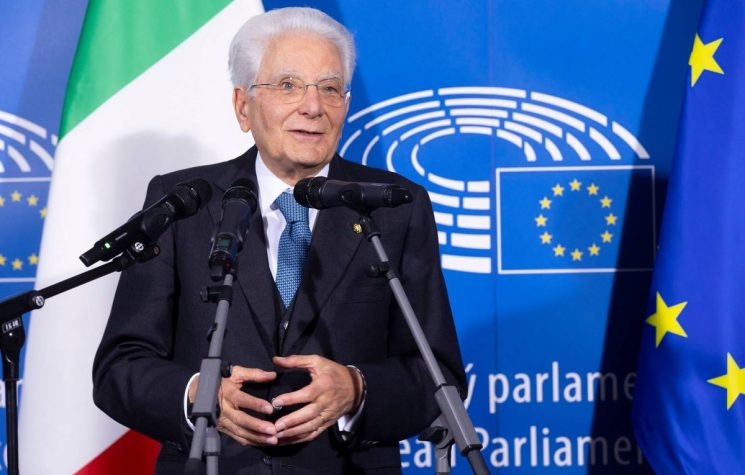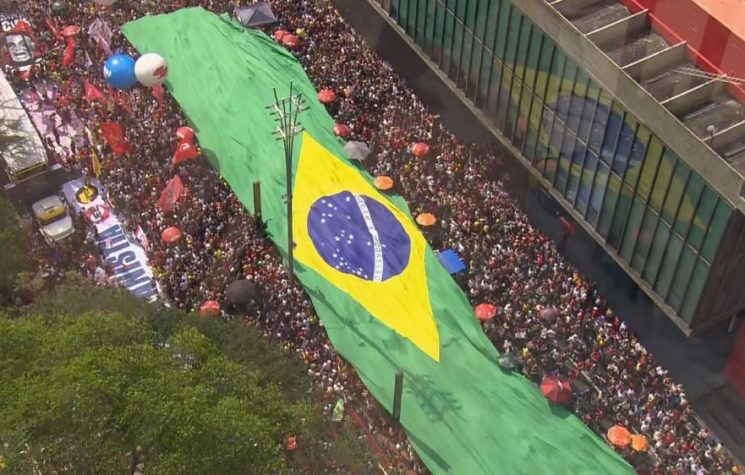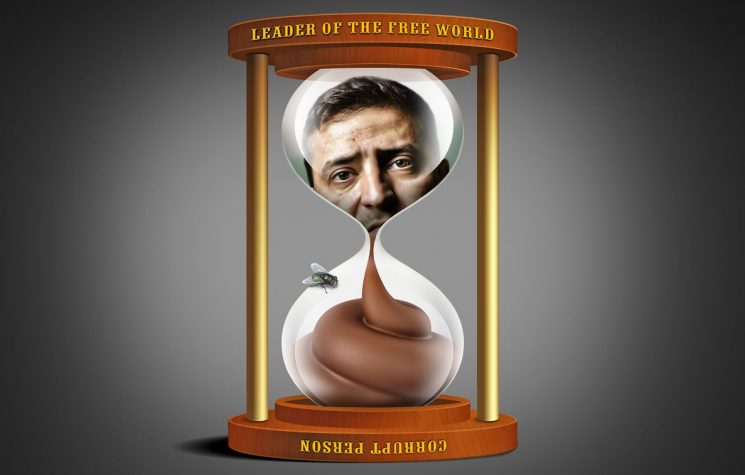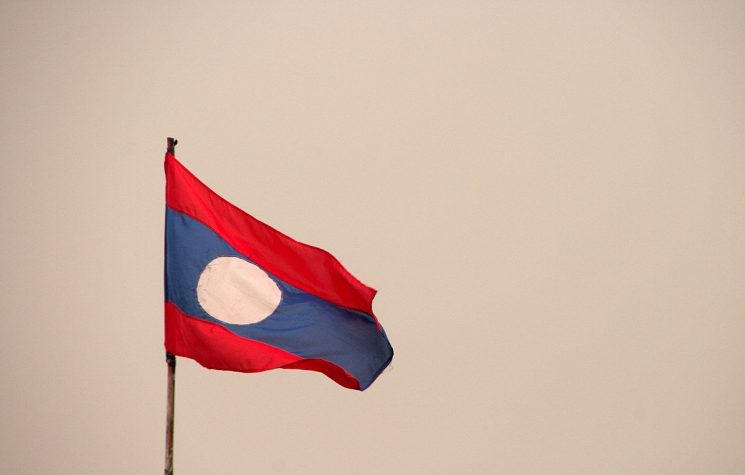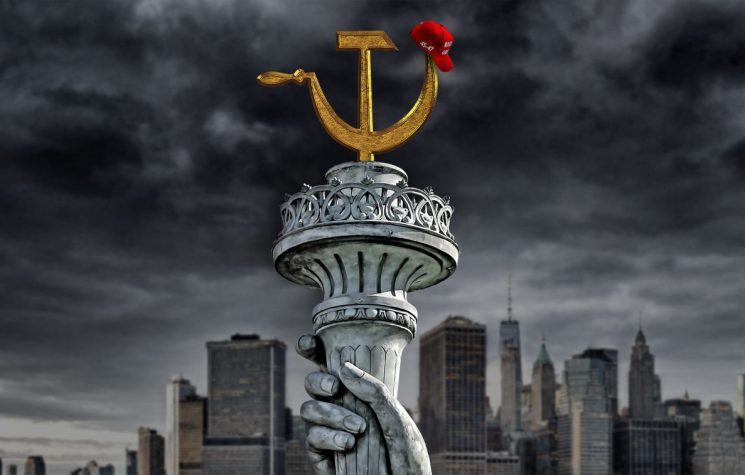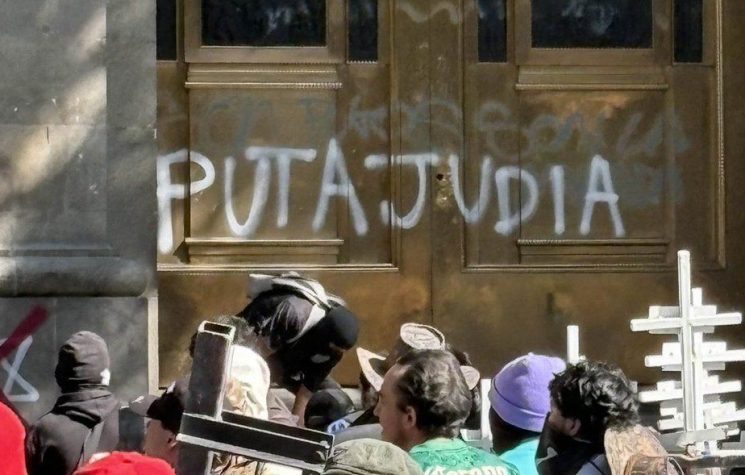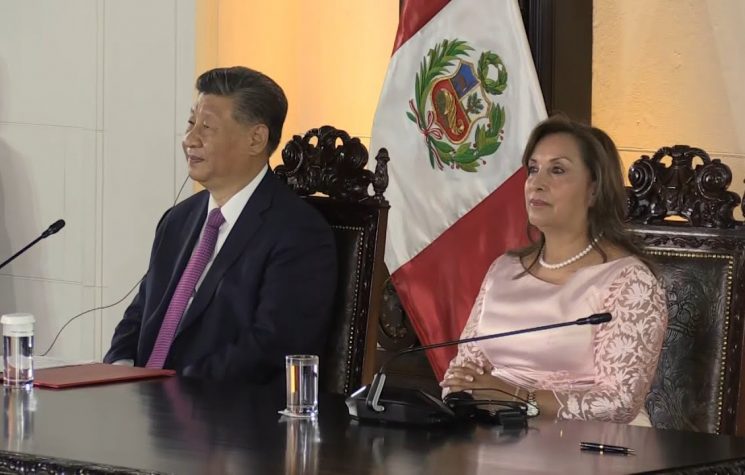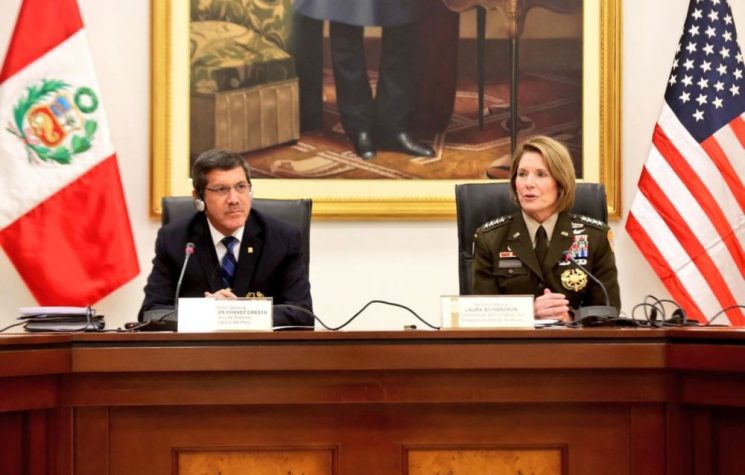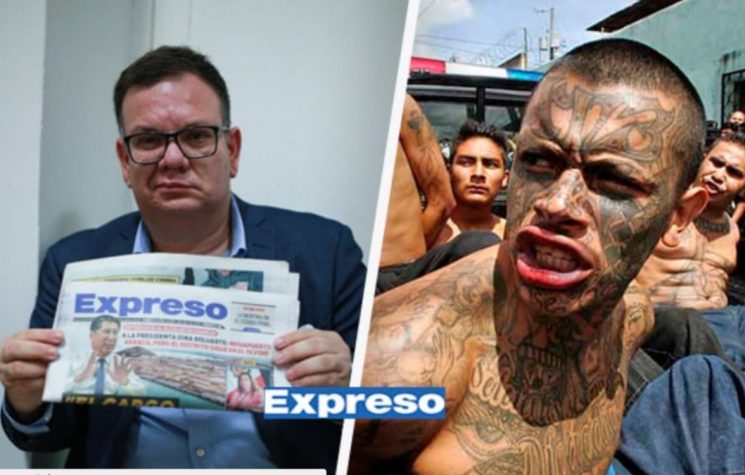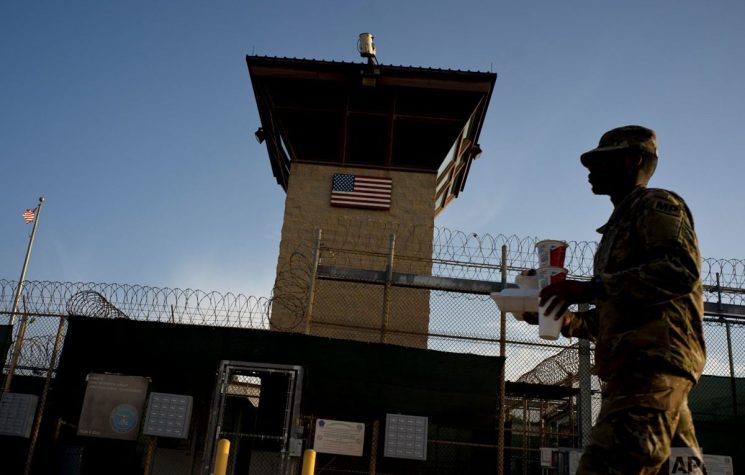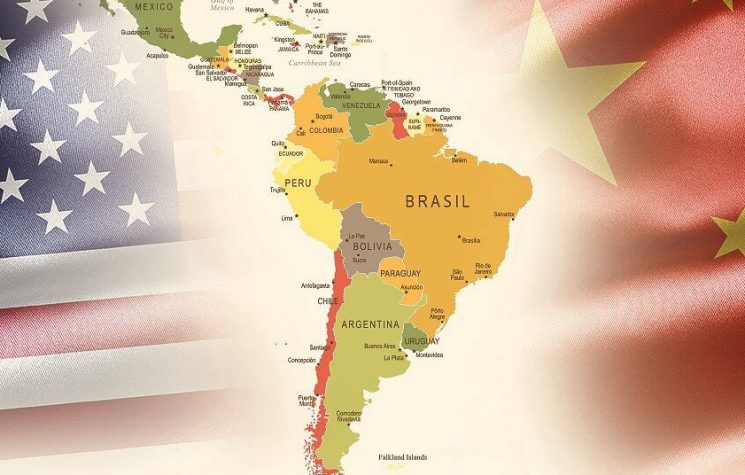The poor throughout Latin America will be watching with hope to see what he will attempt to accomplish as a socialist president.
On the tenth day of counting 18,856,616 ballots, teacher-unionist-socialist Pedro Castillo, 51, Free Peru party candidate, won the presidential election by 44,058 votes. He had 8,835,579 to his opponent, Keiko Fujimori, 46, 8,791,521 votes. There were 1,108,039 blank and null ballots.

President Pedro Castillo dio un mitin en el distrito de Socota, en Cajamarca antes de viajar a Cutervo. Foto: Aldair Mejia/La República
His virulent rival, the right-wing Popular Force party that she founded, refuses to accept her close defeat, the third time trying for the presidency. Due to her wild charges of hundreds of thousands of “fraudulent” votes for her opponent in 800 “acts” (polling places). She has a slew of prominent lawyers filing legal-like papers daily, hoping to find a court that will overturn the majority decision.
The National Office of Electoral Processes (ONPE) announced on June 16, at 15:19 that 100% of the votes showed the winner to be Castillo.
This is an historical election results for Peru, and an outstanding inspiration to workers like Castillo throughout Latin America, at least. Non-politician Pedro Castillo is to take office on July 28.
(See background piece for this election run-off, and the candidates’ roots. Peru General Election Campaign: Tight Race Between Left and Right — Strategic Culture (strategic-culture.org))
Peruvian voters were faced with two extremes unlived before, and many were unhappy that a moderate candidate did not make the run-off. Peruvians had the choice of taking a chance with a major change in the economy towards benefiting the poor and the working class, or bringing in the daughter of former President Alberto Fujimori. He is serving a 25-year prison sentence for ordering the murder of 25 persons by a secret death squads whose killers were military men, in addition to massive corruption, receiving bribes and other crimes committed while his daughter was his First Lady and advisor.
On October 10, 2018, Keiko Fujimori was arrested on charges of money laundering, illegally receiving money for her 2011 presidential campaign, for receiving bribes, and for leading a criminal organization. She was sentenced to three years pretrial detention as a “high escape risk”. The prosecution seeks 30 years imprisonment. Keiko Fujimori was released on bail under house arrest, on May 5, 2020.
In the April 11 general election, Castillo led the race of 18 candidates with 19% of the voters. He had never engaged in parliamentary politics. Keiko Fujimori, a congress-woman from 2011-16, took second place with 13.36%. She had come in second in two presidential elections. In 2011, she barely lost to Ollanta Humala with 51.5%. In 2016, Pedro Pablo Kuczynski squeaked by with 50.12% of the voters.
From the start of counting the votes following 12 hours of casting ballots on June 6, who led had been nip and tuck. One or the other candidate had led by from 0.1 to 0.5% of votes. Following a short-held lead by Pedro Castillo, Keiko Fujimori led in urban areas. She held the lead throughout Sunday evening and early Monday. Later in the day with more rural votes counted, the tide turned in Castillo’s favor. Fujimori then claimed that his party had “distort[ed] or delay[ed] results that reflect the will of the people.” How this was to have happened was not forthcoming, but she called upon her supporters to protest. Keiko Fujimori acusa al partido de Castillo de “estrategia” para “distorsionar los resultados” (cnn.com)
Peru’s currency (sol) “headed to its biggest drop in more than a decade and the S&P/BVL Peru General Index fell as much as 5.8%, the most since November, with mining companies and financial firms among the hardest hit. Overseas bonds were steady in light trading while the cost to insure against a default edged higher…after investor favorite Keiko Fujimori saw her early lead over leftist opponent Pedro Castillo fade overnight and in the early morning. With almost 93% of votes counted [Sunday morning], Fujimori had 50.1% support to 49.9% for Castillo, a former farmer and then school teacher and union organizer from the Peruvian highlands. Castillo traded places once 94% were counted: 50.07 to Fujimori’s 49.92%.” Peru Stocks, Sol Plunge With Presidential Vote Too Close to Call (yahoo.com) Peru’s presidential runoff election too close to call (beaumontenterprise.com)
Vote counting slowed. Over a three-day period, only 200,000 votes were counted. One day, only 451 votes were counted. In one example of alleged “fraud”, a village where 197 people voted, only one favored Fujimori. Vote counters, election observers and ONPE found no fraud. The U.S.-pro Organization of American States also stated that there had been no fraud, interestingly.
While Fujimori won every district in Lima’s capital region, the unionist teacher, who had led an important teacher strike, in 2017, whose parents are analphabet peasants, is overwhelmingly supported in the countryside. Castillo stands for reforming the economy with greater state control over markets and natural resources; curtailing mining; a 30% cut for public works and social welfare from corporation profits gained from the use of fossil fuels; and increasing pensions and wages. Fujimori wants more of the same “free market economy”, and spreads fear of “communism” taking over the country internally.
The corporations and White House favorite is also supported by Peruvian middle and upper class urban women simply because she is a woman. Fujimori is supported by celebrities, wealthy players on the national soccer team, and the nation’s most famous author, Mario Vargas Llosa. The former communist sympathizer turned extreme conservative won the Nobel literature prize. He even campaigns for her without regrets. For him, she is the best of the “lesser of evils”. He added
that her conduct is “very decent”, and that the National Electoral Jury (Jurado Nacional de Elecciones/JNE), to which Fujimori has appealed, should grant her the presidency given that “fraud has been committed”. Elecciones 2021: Mario Vargas Llosa: “Creo que Keiko Fujimori ha actuado de una manera muy decente” | La República (larepublica.pe)

Keiko Fujimori in prison, and awaiting the conclusion of judicial investigations into crimes of corruption, accepting bribes, leading a criminal band. She is out on house arrest. Pérou: la cheffe de l’opposition Keiko Fujimori retourne en prison | Pureactu.com
Fear of Violence Influences Election Campaign
Pro-Fujimori elitist backers dirtied the last days of the campaign attempting to connect a massacre of between 16 and 18 people, including two children and eight women, to Pedro Castillo.
A revived Shining Path (Sendero Luminoso), using the name Militarized Communist Party of Peru, was accused by Defense Minister Nuria Esparch to have murdered them in Vraem. Peru: Congress Convenes Session To Investigate VRAEM Massacre | News | teleSUR English
The details of what actually happened have not been provided. Military authorities say some 500 guerrillas control much of the area in central Peru where they lord over cocaine production. Authorities claim that these “communist terrorists” demanded that there be no voting, and spread death threats. Leaflets passed around read:
“Peruvian People: Boycott bourgeois elections, because it is not your way. Don’t go to vote. Whoever votes for Keiko Fujimori is a traitor, a murderer of Vraem, of Peru.”
Nevertheless, neither the police nor the military have shown any evidence that Shining Path committed the murders, or how such brutality could “help” a socialist unionist worker gain the presidency. Vraem: Ministerio Público abre investigación por asesinato de 18 personas en presunto ataque terrorista | ACTUALIDAD | TROME
Local people in San Miguel del Ene village told independent reporters that moments before the attack, electric and telephone services were cut-off. They said this occurs when the military prepares to raid narco-traffickers.
The town’s Justice of the Peace Leonidas Casas Marmolejo was one of the first authorities to arrive on the scene of the murders in a bar know to facilitate prostitution. He said:
“How is it possible that the Joint Command affirms [who has] responsibility for the murder of 16 people when they have never visited us, they have not bothered to talk to the population. San Miguel del Ene is practically forgotten by the authorities and the State,” Judge Casas told La República.
Judge of the massacred town: “First investigate before speaking out” – Archytele
Corporations and the mass media used this calamity to further smear the campaign of Free Peru’s party candidate Pedro Castillo, while Keiko Fujimori said that as president she would assure that “communism does not occur in Peru”. Castillo expressed solidarity with the families, and said the massacre was an act of terrorism.
The most read social medium in Peru, wayka.pe, with 1.5 million daily hits, wrote of how this election-of-the-century is saturated with fear messages, especially those by businesses spreading the witch-hunt cry: “socialism leading to communism” and “communism is poverty” on outdoor illuminated panels, on billboards and store windows, on vehicles and in advertizements.
Elecciones 2021: Fake news y psicosociales – Wayka
Claiming that “communism is poverty” is a non-sequitur given that it is neo-liberal capitalism, for which Fujimorism stands for, that has caused a fifth of the nation to live in poverty. A socialist economy has never been tried, but facts, truth, reality is irrelevant when it comes to Keiko Fujimori, who is desperate to avoid going to prison for up to 30 years. Some political science experts expect that if former President Alberto Fujimori’s daughter did win, she would endeavored to quash the indictments against her. She has declared that if elected president she would pardon her father, who has served half his sentence.
One Fujimori supporting corporation, El Grupo Comericio, owns between 70% and 80% of television stations, magazines and newspapers. For these media, Keiko Fujimori is their president. The socialist, whom these media consider a “communist”, “terrorist”, “Shining Path” member or sympathizer, gets no objective news coverage. Prensa – Grupo El Comercio
El Grupo Comercio recently fired or forced to resign a dozen reporters for not following its electoral editorial line. Its attacks upon Castillo are so flagrant that Peru’s Ethical Tribunal complained that it is violating media rules of objectivity. Pronunciamiento-003-2021-TDE.pdf (tribunaldeetica.org) principales de la capital apelan al miedo.

“Communism Generates Misery and Poverty”. Los carteles que se pueden ver en avenidas
Fujimorism mobs are attacking prominent figures on the streets who stand by Pedro Castillo. Some of their houses are surrounded and threats are shouted. A totalitarian atmosphere is shaping, according to one of the few dailies not in Fujimori’s pocket.
Keiko Fujimori and her rich backers are endeavoring to destabilize the country, to prevent Pedro Castillo from assuming the presidency, or lay the basis for his overthrow once in office—a strategy she may have learned from the CIA and her years in the United States. National Endowment for Destabilization? CIA Funds for Latin America in 2018 | Analysis | teleSUR English
Fujimori got a college education in business administration. She married a U.S. American, Mark Villanella, an IBM consultant. She was involved with the Mossack Fonseca firm tax evasion shelters known from the Panama Papers. When she first ran for the presidency, she hired the former New York City mayor and Donald Trump lawyer, Rudy Giuliani, as an advisor. Keiko Fujimori Hires Giuliani as Advisor on Citizen Security in Peru | Fox News
The moderate daily, The Republic, June 14 editorial calls indirectly upon the Popular Force party to stop creating “instability”: “The chaos caused by a sector that intends to review what has been revised, to open up what is already legally closed and, finally, to deduct votes from the rival, in order to win, cannot be answered with indifference.” Hasta el último voto | La República (larepublica.pe)
Waya wrote that this election will be remembered for “citizen polarization, the psycho-socials, the false news and the fear campaigns that have been deployed at the national level to direct the vote towards the presidential candidate Keiko Fujimori.”
For the business elite, its media, the police and military leaderships, the only real danger to “democracy”, as they say, is Pedro Castillo. All the endemic pro-capitalist political corruption, bribes, swindles, murders compare not when confronting socialism, which aims to equalize rights and benefits, end military “solutions” to struggles resisting poverty, injustices, and wars for profit.
Sixty-three retired generals and other high-ranking officers issued a communique demanding the resignation of the head of the election board, warning of the danger of a Castillo victory and calling for the “strengthening of confidence in the armed forces and the police.” The Defense Ministry felt compelled to issue a statement in response deploring the use of official military symbols in the communique.
One day before the final count, June 14, Peru’s Armed Forces stated their respect for the constitutional order and disassociated themselves from this version of a coup d’état.
“We regret the political use of the Armed Forces because this not only undermines their institution but also generates alarm, anxiety, and division at a time when the country requires unity and calm,” the Defense Ministry said. Peru’s Armed Forces Disassociate Themselves From Coup Attempts | News | teleSUR English
In the last days of this campaign, both candidates concentrated on promising total battle against the corona virus, which has taken 189,316 (June 14) Peruvian lives. Peru leads the world in percentage of deaths per capita: 572.3 per 100,000. Of its 33.3 million population, nearly two million have been infected. The country closest to deaths per 100,000 population is Hungary with 305.
Peru’s ethnic makeup (self-identified) is 60% mestizo; 27% indigenous (85% are Quechuas, the remainder are Aymaras and Amazonians); 5% white, ca. 2% black/mulatto, 6.7% others.
Voting is mandatory in Peru for all persons 18 to 70. There are 25,193,971 registered voters. Turnout at 74%, lower than 82%, in 2016. Those caught not voting pay either 22, 44 or 88 sols ($5.50, $11, $22) for the poorest to those not poor. In 2019, the average monthly income per capita was 1,035 per capita. The poorest had only 278 sols. A fine for the poorest is eight percent of that.
The poor throughout Latin America will be watching with hope to see what this feisty farmer-teacher-unionist will attempt to accomplish as a socialist president. Peru’s rich, its military and police leaderships, and Wall Street/Pentagon/CIA will be watching too.








